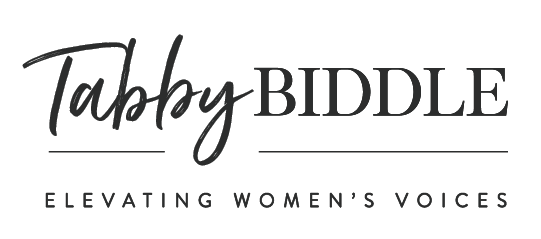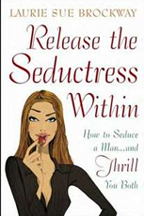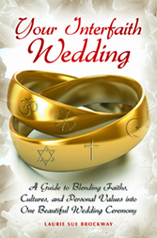Laurie Sue Brockway is Goddess of the Week
Interview by Tabby Biddle
"As a writer, interfaith minister, supporter of women's dreams, and true fan of the Goddess, I decided to follow my natural response to my search for the Divine Feminine: I would write a book that would help other women do the same ... If women can connect with the many goddesses of the world, I wondered, won't that also help us recognize the goddess within?"
-- Rev. Laurie Sue Brockway, Author, Interfaith Minister, Editor
Laurie Sue Brockway spends her time inspiring people by day, writing books at night, and marrying people on the weekend. A former Editor-in-Chief of Playgirl Magazine and journalist specializing in women's empowerment, Laurie Sue was called into ministry at age 40.Between years of covering women's stories and later leading Goddess groups, Laurie Sue has been long devoted to helping women tap into their inner power. As a minister, she quickly gained recognition as an expert in women's empowerment, self-esteem and spirituality.
Today, in her position as a Senior Editor at Beliefnet, she has been able to return to her roots as a journalist and combine this with her training as a minister. She inspires and empowers women on a daily basis, and continues to apply her wisdom in the area of male-female dynamics, romance and relationships. What a goddess!
Tabby Biddle: You received the call to ministry when you were 40 years old and from there, reinvented your life. I think many women feel callings or stirrings of callings, but don’t necessarily follow them. Tell me about your calling and how you knew to follow it.
Laurie Sue Brockway: Sometimes a calling is very subtle and sometimes it comes with a somewhat traumatic experience. For me, it came through a very traumatic and dramatic experience in my life.I had spent 20 years as a journalist, and was very focused on sexuality. I had written many books on sexual topics and sensual love. I was Editor-in-Chief at Playgirl Magazine. Then my dad died. And this changed my whole being.In the process of his dying, I sought out advice and any information I could get on how I could help him die. I thought I was doing this to help him learn how to let go. But it was really of journey of me learning how to let go and how to accept my father’s death.
We had a number of family issues that were unhealed, and I realized that his funeral would be a time to create a healing.I brought a couple of my goddess friends with me, and I did the funeral myself. I actually did his Eulogy. My friend Barbara Biziou did a healing circle for us, and another goddess friend of mine, Laura Norman, just held the space. My uncle had brought a minister with him, but I didn’t let him say anything until the very end.After the funeral, he called me over. I thought he was going to tell me that I had done something horribly sacrilegious. But what he said to me was, “Have you ever thought of becoming a minister?”
TB: Had you?
LSB: No. Never. It had never crossed my mind. I was in the middle of writing a book called How to Seduce a Man and Keep Him Seduced, and was the Editor-in-Chief of a magazine called Single Living. I had just left my job 10 days earlier as Editor-at-Large at PlayGirl. Although I had never thought about becoming a minister, it was this minister saying something to me at a time in my life when I was open and more ready to experience spiritual growth that actually became my call to ministry.
TB: That is so interesting.
LSB: It was not the path that I was on. But then I looked back and realized that since I was 15 years old, I had been giving people advice on relationships. I was always the person that people talked to – the shoulder to cry on. So actually I think I had a ministry all my life.
TB:What would you say are the major differences between your life as a journalist and your life in the ministry?
LSB: Back when I was a reporter, I did not have to have both feet in the room. I was the reporter. I was there to observe. I was there to take notes. I was there to get a story. I didn’t have to be accountable for the emotions or the spirituality. I didn’t have to solve the story or the mystery.As a minister, it’s a different kind of energy. I get a chance to be a part of people’s everyday lives — and the most significant part of people’s lives — their weddings, and sometimes the burial of their loves ones, or the memorial, or the blessing of their babies, or the blessing of their pets. So it’s a whole different experience. For me, it’s a chance to be really present and be there for people – and not just the observer.
TB: At this point in your career, you have written 14 books of your own, and have ghosted and edited 35 others. I know a lot of women who dream about writing a book, but never take the steps forward to actually do it. What would be your advice to them?
LSB: What I’ve seen in all of my years of writing books, and talking to people who want to write books, and talking to those who have written books, is that in order to write a book, you have to sit down and write it. What happens is that people get completely lost in the story of the book and the conversation of the book. They fall in love with the idea of the book. But so many people never sit down and write it.
"There is no such thing as writing a book without writing, if you want to be the writer of the book."
It’s really fine to not write the book if that’s not what you are meant to do. But if you do want to write a book, sit down at the computer and do a page a day until you get up to two pages a day. Or do an hour a day, or 10 minutes a day. Whatever it is, you’ve got to write.
TB: You are an interfaith minister, an editor at Beliefnet, an author, a coach and a teacher. This is impressive. I know many women who struggle with integrating all the different aspects of themselves in their careers. How have you done this?
LSB: I was talking to a friend today and we were talking about how some people really like to relax, kick their feet up, and take time off, or go on vacations. I actually feel better when I am creating things. I am one of those people who really thrives on creating things.
"I feel motivated by the idea that I get to create things that I enjoy doing and there is a service to people on the other end of it."
At the moment I have a full-time job as an editor on a major website, and I go home in the evening and I write books. And on the weekends I do weddings. I work a lot. How do I balance it all? Sometimes I don’t. Sometimes it’s out of balance. I have to say that I have a really great partner, and he will say that he is responsible for all of it. He really deserves a lot of the credit.
TB: In The Goddess Pages, you mention that having covered women’s issues as a journalist for many years, you found that one of the biggest challenges we face as women is low self-esteem. Have you dealt with self-esteem issues?
LSB: Oh yes, I deal with them every single day [laugh]. We teach what we need to learn. It’s really true. I think it was my own struggle with self-esteem that led me to write that book. It was my own struggle that led me to bring the Goddess into my life in that way, and that led me to want to bring her to a wider audience. Although I felt like she wanted me to bring her to a larger audience.
TB: Talk to me more about self-esteem.
LSB: Self-esteem is a tricky thing. Some days we are stronger than others. Some days we wake up in the morning and feel really good about ourselves and feel like we can conquer the world. Other times there are things in our lives that begin to either erode our self-esteem or challenge it. When you go through loss, for example, you are grieving, and maybe you are in a slightly more vulnerable or weakened state.You have to have a true center that is your center. It can't be a center that is related to somebody else because that’s worth by association. And it can’t be knocked around by anybody else. There are a lot of angry people, jealous people, upset people, and even imbalanced people who might come your way. You have to have that center so that every word or every wave of energy that comes at you does not knock you down.
There are a lot of women who are just so overworked with work and family and relationships. With so much to do they just don’t have enough time for themselves to find that center. I think as women we really have to learn how to put that emergency oxygen mask on ourselves first, before we put it on another person. We have to remember that we can’t consistently give, give, and give of ourselves and then start giving away parts of ourselves without suffering. We need to learn how to say: “Sorry I can’t do that right now.”
TB: How did you first discover the Goddess?
LSB: I first really discovered the Goddess when I was in seminary school. I had learned a little bit about her before that, but in seminary school I discovered that there were goddesses in every religion. I was a little shocked that we weren’t talking about them every time the class met.
I started to explore and dig down deeper to find out about goddesses from different cultures. It was a way to kind of affiliate divinity with women. I think men automatically feel like they are connected to the Divine because there are so many images of a male divine for them to relate to. And yet, the image of the feminine divine is not as prevalent in our culture.I think there is an opportunity to affiliate ourselves with the feminine divine in such a way to realize that we have that within us as well. But we have both – it’s the male and the female divine. I don’t think it’s one without the other.
TB: You have said that one of your strongest callings has been to wedding ministry. Tell me more about that.
LSB: Because I did my dad’s funeral, I thought I was going to be a minister who did a lot of funerals, but the first thing someone asked me to do was a wedding. I realized over time that I just had a very strong calling to that particular kind of ministry. I think it was a natural progression for me because I was covering sexuality and relationship dynamics as a writer and journalist.
I find it changing also. This summer I was called into a lot of prayer for people who are sick and dying. I’ve also been called to a lot of funerals and memorials. I find that I am taking more responsibility in the realm of ministry. For example, sitting by the bedside of someone who it dying, and praying with people who are really frightened.I'm also helping people make their dreams come true, which is more of a consulting aspect of ministry.
TB: Tell me about your newest book, Your Interfaith Wedding. What do you want people to know about it?
LSB: At this point, about 37 percent of all married couples are interfaith couples. The interfaith phenomenom is not just about two faiths coming together, but it also involves cultures coming together. It could be that two people come from Catholic families, but one is from a South American country and one is from a North American country. The whole way they worship and the way everything is done is different.I think when people get married, unless they are relying on a very standardized kind of ceremony in a church or a synagogue, they don’t necessarily know what kind of ceremony they’d like to have, and they also don’t know what’s possible.
So the book is really a collection of hundreds of ideas, prayers and blessings, quotes and insights from different traditions, rituals, and actual whole ceremonies. The hope is that people can read the book and say: "Okay, my beloved is Christian, and my family is Hindu, so if we wanted to create a ceremony where we can honor both of our faiths, and especially honor both or our families, what would be the best way to approach it? How do we make sure that it includes everyone as part of the celebration?"
It's designed to help couples ask the right questions throughout the process so they really understand what they want to create together.
TB: If you had a loudspeaker that made it possible for women around the world to hear your voice, what message would you want to impart?
LSB: I think the most important message I would want to impart is to love yourself, nurture yourself, and give to yourself. I would say to also let other people support you, and love you, and nurture you – and don’t feel that you need to be the heroine who saves everybody. Ultimately, to keep yourself balanced, you have to get yourself into a balanced exchange of giving and receiving.
To learn more about Reverend Laurie Sue Brockway and her work, you can visit the following websites: LaurieSueBrockway.net and WeddingGoddess.com and www.Beliefnet.com
Tabby Biddle, M.S. Ed., is a writer, writing coach and reporter dedicated to amplifying the voices of women changemakers. She is a regular contributor to the Huffington Post on issues affecting women and girls, and has been featured by the Los Angeles Times, USA Today, NPR, Current TV and other popular media. She lives in Santa Monica, CA with her husband. Learn more at tabbybiddle.com








